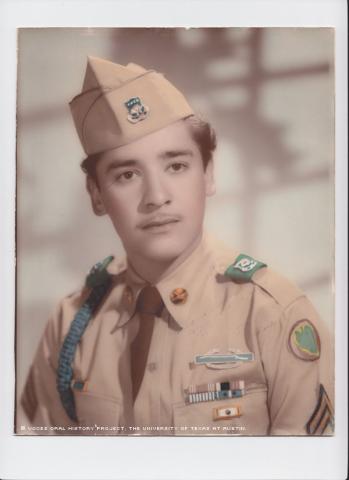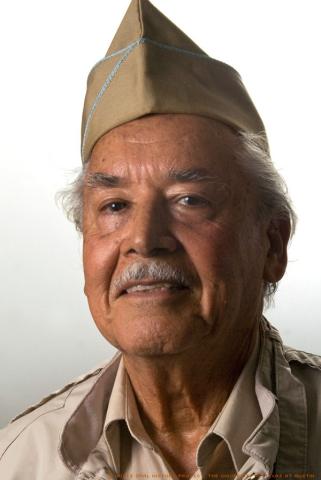By John Weber
Jesus "Chuy" Ramirez believed serving in the U.S. Army during the Korean War taught him responsibility.
But even as a child, Ramirez, the oldest of four growing up on a farm in the Mexican municipality of Mexicali, Baja California, had many obligations.
He had many memories from a tough childhood. He recalled when his father kidnapped him and his three siblings after lying to school authorities about their grandmother's health. Ramirez's parents, Fortunato Ramirez and Maria Cecilia Navarro Ramos, had been involved in a custody battle.
His mother notified authorities and engaged an attorney. But it was three weeks before Ramirez and his siblings were rescued from their grandfather's farm. The children rejoiced when they saw their mother, he said.
After that, his aunt, who also lived in Mexicali, took care of the children for nine months in Guadalajara, Mexico, until their mother felt it was safe for them to return to Mexicali.
Moving from Mexicali to Guadalajara, back to Mexicali and then to Tijuana stalled his education. Ramirez had to repeat the first grade at least twice and did not become fluent in English during his school days.
When his mother remarried, Ramirez was 12 and jealous of his stepfather. He recalled sticking nails in the tires of his stepfather's Cadillac. Despite his animosity toward his stepfather, Ramirez worked on his farm and saved the money he earned for his mother.
When Ramirez was 17, he moved to the United States and tried to enlist in the Army. But he was rejected because of his age and because he did not understand enough English. As soon as he turned 18, he dropped out of school. Soon after that, he was drafted.
"I wanted the adventure," Ramirez said. He also felt it was his duty to serve his country. He remembered agreeing under oath to "defend the United States" and was determined to keep that promise.
Though he had received recruitment letters from the U.S. Navy, Air Force, and the Marines, Ramirez wanted to be in the Army. In 1952, he was sent to Los Angeles to be sworn in and then for basic training to Fort Ord, a now closed base on Monterey Bay in California.
He recalled being nervous when he heard of the Korean conflict.
"But that didn't mean I was going to Korea," Ramirez remembered thinking. He recalled that many who went to South Korea never returned. About 1.7 million Americans served in South Korea, and nearly 34,000 were killed in action there.
Ramirez took an optimistic view of facing the Korean War, telling himself that it would be "the only thing I had to worry about."
Bilingual officers helped Ramirez in his training, and he was sent to classes to learn English.
"Other guys would get mad because I would get out of cleaning ... . They said I was faking it," Ramirez said.
After training ended in December, he expected to leave for Korea. He was to go to Japan first, on a vessel known as "General Wiggles," the transport ship USS Gen. William Weigel.
The Army gave soldiers two weeks to go home before shipping out. He never forgot the look on his mother's face when he said goodbye.
"It killed me ... seeing her cry and how sad she was," Ramirez said, admitting that he had cried too.
At sea, the General Wiggles struggled through a storm that lasted three days.
"I didn't think I'd survive," said Ramirez, "but after the storm, we were clear sailing."
Basic training was good, according to Ramirez, and it helped him learn to train his nerves in battle for a better chance of survival.
After three months in Japan, Ramirez and his company received emergency orders to leave for South Korea. He served in Company C, 1st Battalion, 19th Infantry Regiment, 24th Infantry Division, 8th Army.
"I didn't like this," said Ramirez, "because I had to leave all my nice stuff behind."
South Korea's terrain was rough, and extreme temperatures marked both summers and winters.
"During the day it was real hot," Ramirez remembered about summertime. "While we were living in tents at night, it would rain, but still be hot. So we would take a bath in the rain because it was warm. But, during the winter, it was so cold -- below zero temperatures."
Ramirez recalled his most important operation during his time in Korea was to re-capture all escaped North Korean prisoners.
"The prisoners of North Korea wanted to stay in South Korea," he said, "but the U.S. had to take them back."
Just as he had done before the war, Ramirez sent a good portion of his Army wages home to support his mother and his siblings.
"One good thing I learned in the Army was to be responsible for things and also to do what I'm supposed to do," he said.
Mr. Ramirez was interviewed by Valerie Martinez in National City, California, on June 7, 2010.



